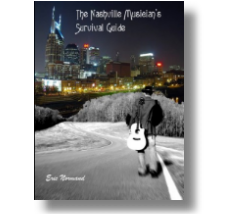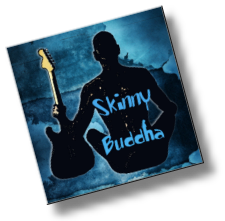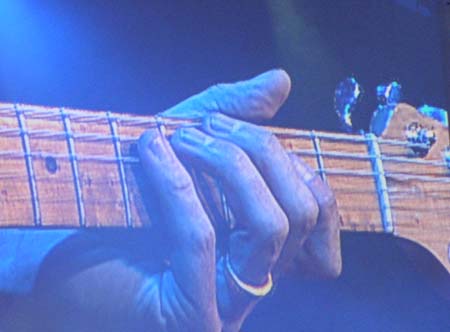
As a professional freelance musician working and living in Nashville, much of the work I perform is for other people’s entities, as is true for many hired guns. I’m not complaining mind you, this is how the bills get paid. My regular gig as tour manager/guitarist for Rhett Akins occupies many weekends throughout the year, and sporadic nightclub gigs and songwriter recording projects help to fill in the gaps. As rewarding as some of this work can be, it all comes under the heading of ‘gun for hire’ which means I must meet somebody else’s expectations, as they are footing the bill, often adjusting my musical tastes and desires to fit the gig.
So whenever it’s feasible, I take on gigs purely for my own musical expression, a little ‘music for the soul’ as I call it. Now that fall is here and the annual touring/festival season is drawing to a close, I’ll have a little more time for these kinds of endeavors. With that, I’m excited to tell you about my new project – Eric Normand and Endless Boogie. The concept of this band is simple. I will play only music that I enjoy playing, with people whom I enjoy playing, in venues that are enjoyable to play.
Growing up in the 70s and 80s I always looked back a few years to find my musical heroes; Jimi Hendrix, the Allman Brothers, ZZ Top, John Lee Hooker, and to this day this is still some of the most expressive music I ever play. So in my new Nashville based ‘fun band’ that’s just what were going to do. The song list will contain Hendrix classics like Little Wing, Voodoo Child, and All along the Watchtower, Allman Brothers classics like You Don’t Love Me, Ain’t Wastin’ Time No More, Melissa, and Whipping Post, classic blues songs like Freddie King’s Going Down, John Lee Hooker’s Hug You, Kiss You, Squeeze You, and even a few of my favorite instrumentals by Miles Davis and The Meters. Needless to say, we will put our own spin on these.
As I live in Nashville, and this kind of song list will not command top pay, getting great players to commit to a gig like this isn’t easy. All the best players are usually pretty busy taking the most lucrative gigs offered, and even if you get them to commit, something always seems to come up. So you either have to have two or three players deep on each instrument that know your material, or you have to wait till the last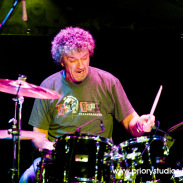 minute to book the players. I got real lucky for this first outing of Endless Boogie as a couple of my good friends, Fran Breen and Mike Chapman, just happened to be available.
minute to book the players. I got real lucky for this first outing of Endless Boogie as a couple of my good friends, Fran Breen and Mike Chapman, just happened to be available.
Fran Breen is a world-class drummer from Ireland that has worked on and off in the Nashville music industry for over 20 years. He’s played with a few major artists like Lucinda Williams, Nancy Griffith, Shelby Lynn, and is also an accomplished session drummer having played on countless projects over the years including the soundtrack for the movie “The Commitments” . He’s a top notch groove machine, especially when it comes to blues and funk, and I’m thrilled to have him on the gig. (Plus he is really funny and has the coolest Irish accent.)
Mike Chapman is one of the best bassists Nashville has to offer, and another ace in the hole who happens to be a good friend of mine. Mike’s first big gig was with Hank Williams Jr. in the early 80s, since which time he has played on innumerable A-list recording sessions ranging from literally all of Garth Brooks recordings to Leanne Rimes, Brooks & Dunn, Huey Lewis and countless 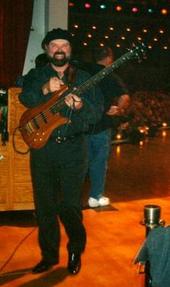 others. Mike has played bass on over 30 number 1 singles and the albums that he has played on have sold over 150 million copies. If it sounds like I’m bragging a little bit about these guys, it’s because I am. I mean how often does one get to say “My drummer played on the Commitments soundtrack” or “My bass player has been heard on 150 million albums”?
others. Mike has played bass on over 30 number 1 singles and the albums that he has played on have sold over 150 million copies. If it sounds like I’m bragging a little bit about these guys, it’s because I am. I mean how often does one get to say “My drummer played on the Commitments soundtrack” or “My bass player has been heard on 150 million albums”?
The last ingredient for my first outing with ‘Endless Boogie’ is a fun venue in which to play. The Fillin’ Station, located on Main Street in Kingston Springs, is the perfect venue for an intimate night of exploratory rockin’ blues and funk jams. While playing on big tours in front of thousands of people can be exciting, sometimes the finer points of the music get lost in the ‘bigness’ of those events. To this day, my favorite musical settings are small to midsize nightclubs, for it is in these small-town bars and juke joints of the world where the magic really happens. The Fillin’ Station is owned by Patrick Weickenand, former member of Eric Burdon’s band ‘War’ and one of the nicest guys you’ll ever meet who also blows a mean harp from behind the bar from time to time. The club is small but comfortable, and has an adjoining outdoor patio which fills up with locals on many a night. The club is just 25 minutes from downtown Nashville (exit 188 off of I40 west) and features live music four to five nights a week year-round, never with a cover.
I’ve been wanting to put together a group like this for a few years now, toying with the idea periodically, but never quite getting organized enough to make it happen. But I’ve realized that this is just what you have to do in Nashville, you have to find a way to not lose sight of your own vision even while you spend most of your time working for other people. My musical dreams at this point of my life are quite simple, I want to play the music that I love to play, the way I want to play it, hopefully taking a few others along for the ride.
So that’s it, all the essential ingredients are in line for an expressive night of music – songs I enjoy playing, people I enjoy playing with, and a place I enjoy playing at. Our show will be this coming Saturday, October 16 from 7:00 to 11:00. I’m really pumped for this show, so if you live in the Nashville area come on down for a night of Endless Boogie!
Some people play music for the sheer joy of it, others do it for the money, and many fall somewhere in between. But regardless of music being a career or a hobby, the level of personal enjoyment and satisfaction achieved is largely up to the individual.
I started out as a young boy learning how to play music because it intrigued me. I had made some kind of spiritual connection early on (although I couldn’t have described it in that way at that time), and I felt compelled to play music. I was drawn in to this exciting new world and it was fun for me. Many years later, the thought entered my mind that “Hey, I love playing music, why not make a career out of it?” I gradually began to move in that direction, albeit without a clue as to where I was heading or how I would get there.
In the article ‘Making It’ in the Music Business – An Alternate View for the Independent Musician Graeme Kirk explores this topic in depth. He talks about being in his first band as a teenager and how they had fun in spite of not being very good. At some point into this band expedition he reached a crossroads.
“Like most young bands we reached a stage where reality reared its ugly head. “Get some good equipment”, we were told. “Practice every day…”, “…get a good manager…”, “…learn about the business…”, “..learn to write catchier songs…”
This seemingly good advice proved ultimately demoralizing and eventually his band broke up.
He goes on to write:
“So what?” you may ask. “You just didn’t have the commitment to make it in the music business”. True, but only because we didn’t realize that there can be many different definitions of “making it”. The problem is that most people who were giving us advice don’t realize it either. If we had only been told that there could be more to being in a band than the hard slog, paying your dues, waiting for record companies to notice your path that everyone assumes is the only way to succeed, things could have been much different.
It all comes down to how you define success – how you define “making it”.
The article goes on to talk about the fact that “there is no one path to success because there is no one definition of success.”, a simple, yet poignant thought that speaks volumes about the quandary that faces many musicians.
When you try to make a living as a musician, you base a lot of the decisions regarding your musical activity on financial factors. When paying the bills is directly tied to your gigs and musical activities, sometimes you’ll take gigs you might not otherwise take, basing these decisions on the financial outcome. Sometimes you might join a band or take on work that you don’t enjoy at all, simply because it pays well. On the other hand, some professional musicians are able to enjoy a majority of their musical endeavors, finding at least some shred of enjoyment even in the most difficult situations.
If your career lies elsewhere, your musical life can be of a purer nature. As you are not in it for the money, you are free to play music strictly based on your personal wants and desires, paying no mind to commercial appeal or financial gains. Sometimes the life of a musician who has not made music his career can be more rewarding than that of his professional musician counterpart. Of course this is not always the case either.
So the bottom line is, you have to decide what you want to get out of music, what you want to get out of life, and if having a career in music is needed to accomplish these goals. Maybe you do, but then again maybe you don’t. If you’re thinking about diving in, arming yourself with as much pertinent knowledge as possible is always a good idea. If you’re already well on the path of a career minded musician, keep forging ahead. But whatever you do, always strive to make your musical activites as stress free and fun as possible. Because if you’re not enjoying it, what’s the difference between playing a gig and punching a time clock at a factory job you don’t like.
Enjoying any activity is as much about your perception of that activity as it is anything else. Fun is an attitude, not necessarily a condition, so do your best to maintain a positive outlook and you should be rewarded accordingly. Whether music is your career, your hobby, or something you do for a occasional enjoyment, music is the backdrop of life, and life can be hard. So do your best to make your music count. If you want to have fun with music, make it a conscious decision to do so, because having fun with music is all in your head.
“Decide, commit, succeed!” – Tony Horton
Where do you get your inspiration from? As a lifelong musician, I’ve now been playing music since the age of eight, about 34 years. But I’ve been listening to music even longer. As a young child, some of my earliest memories are of my dad playing records in our Boxford, MA home. Many an evening or weekend the sounds of the Woodstock era filled the air – Santana, Derek and the Dominoes, John Lee Hooker, even the Woodstock soundtrack. The mysterious black discs spinning around created a sense of wonderment, and even more alluring were the sounds 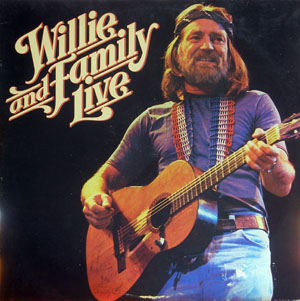 they put forth.
they put forth.
I love music, and I especially love the sound of music that originates from vinyl recordings. There’s really nothing like it. As a teenager growing up in southern New Hampshire in the early 80s, I owned my own stereo and turntable and began buying albums regularly. In fact, I 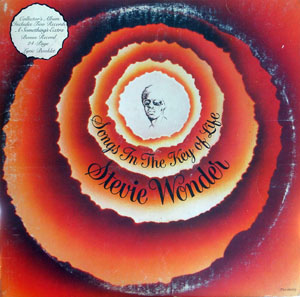 worked at an afterschool job just to support my vinyl habit (okay, maybe a few other habits at that time as well). Every week I would venture to the strawberries record store with my weekly pay burning a hole in my pocket. A short time later I would arrive home to give the new disk a spin, the sounds of Jimi Hendrix, BB King, Led Zeppelin, and others permeating my world daily. It wasn’t just an auditory experience, many records came with amazing artwork, of course you have the great double album which additionally lent itself to a variety of uses. Some albums even came with songbooks or posters.
worked at an afterschool job just to support my vinyl habit (okay, maybe a few other habits at that time as well). Every week I would venture to the strawberries record store with my weekly pay burning a hole in my pocket. A short time later I would arrive home to give the new disk a spin, the sounds of Jimi Hendrix, BB King, Led Zeppelin, and others permeating my world daily. It wasn’t just an auditory experience, many records came with amazing artwork, of course you have the great double album which additionally lent itself to a variety of uses. Some albums even came with songbooks or posters.
Several years into this foray, along came CDs. They kind of looked like mini albums, but with noticeably less artwork. They also had a few other tendencies, for instance the unmusical sound of a digital skip. It took me a while, but I eventually climbed aboard the “CD wagon”, albeit kicking and screaming. It only took me a couple of years to realize the shortcomings of this new “digitally recorded music”, but I eventually did notice. The music just didn’t sound quite as real, warm, or friendly, but this was fast becoming the new medium. It wasn’t long before all my favorite record stores had replaced the bins for records 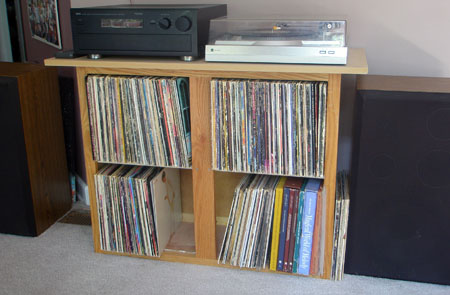 with CDs. Not long after that point in time I stopped listening to my vinyl, as all new music I was purchasing was on CD.
with CDs. Not long after that point in time I stopped listening to my vinyl, as all new music I was purchasing was on CD.
Fast-forward to 2010, and CDs are now being phased out in favor of MP3s, an even harsher sounding representation of music. And of course, the MP3, often living in “the cloud” or an ipod, is completely void of artwork.
Stop, I’ve had enough! Earlier this year I made the realization that I wasn’t listening to music as much as I used to. At first I thought this might have been because I listened to so much music in my earlier years that I might be just “all listened out”. But then I got my turntable repaired, something I had been meaning to do for some time, and slowly, began rediscovering the magical world of vinyl.
I set up the turntable in my living room and began to check out some of my favorite old records. Right away I 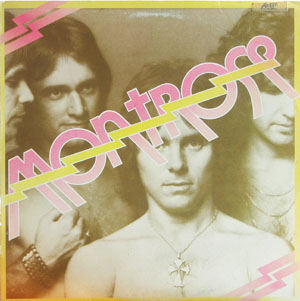 noticed they sounded so good, noticeably better than their harsh digital counterparts my ear had become accustomed to. This rediscovery led me to a few recent trips to a local used record store – let the bargains begin. I can’t believe some of the gems I’ve purchased for just a dollar or two. One in particular was a mint condition copy of “Montrose” Sammy Hagar’s earliest band, and this gem was just 68 cents! Delbert McClinton, James Taylor, Beethoven’s Moonlight Sonata – all for just a dollar apiece?
noticed they sounded so good, noticeably better than their harsh digital counterparts my ear had become accustomed to. This rediscovery led me to a few recent trips to a local used record store – let the bargains begin. I can’t believe some of the gems I’ve purchased for just a dollar or two. One in particular was a mint condition copy of “Montrose” Sammy Hagar’s earliest band, and this gem was just 68 cents! Delbert McClinton, James Taylor, Beethoven’s Moonlight Sonata – all for just a dollar apiece?
Among some other recent scores were a mint condition copy of AC/DC’s Back in Black, Stevie Wonder’s Songs in the Key of Life, and BB King live in London. A couple of weeks ago I found a yard sale with a collection of 4000 records all from the mid-70s or earlier.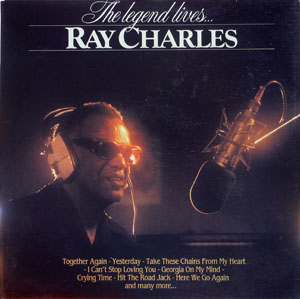 Kelly and I spent about an hour pilfering through about half the collection and walked away with 25 gems for $20.
Kelly and I spent about an hour pilfering through about half the collection and walked away with 25 gems for $20.
I’m hooked, what can I say. Since this recent vinyl resurrection I am listening to more music regularly than I have in years. It really does sound better. Listening to music like this reminds me of why I became so involved with music in the first place – why I became a musician. When I put a record on, it feels like I’m in the room with the band. The drums sound real, the guitars sound right, the bass is tight, and the vocals are deep. I know I can’t listen to these sounds in my car, and beyond the walls of my home the rest of world continues to suffer from the sounds of the sterile digital status quo and all of its shortcomings.
I know a lot of people enjoy digital music, I’m not saying it can’t be done. But if you haven’t ever ever experienced the joys of vinyl, check it out if you ever have the chance. If you’re ever over a friends house and you spot a turntable, request a side. I challenge you to listen to your favorite artist on vinyl and not be able to hear something new in their music.
Well I’ve got to go now, it’s time to give my new Ray Charles record a spin.
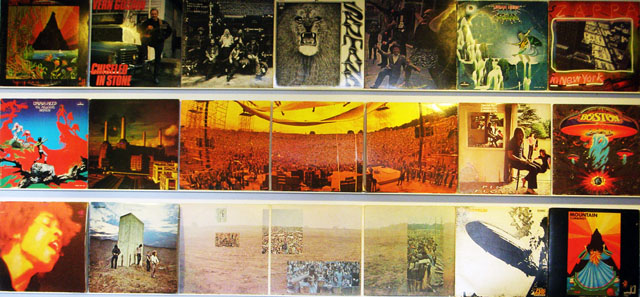
Most musicians, at one point or another, have, or probably will play a gig where one of the other musicians plays poorly or with bad taste resulting in a “painful” musical experience for some. But an even more awkward situation comes at the end of the night when the player in question starts fishing for compliments. You don’t feel a complement is warranted and don’t want to compromise your principles, but to state the totality of your feelings or say nothing might result in an awkward moment and/or damaged relationships. How do you save face without lying?
As the level of musicianship among the world’s performers can vary greatly, it is a near certainty that we will all wind up in this situation sooner later. Sometimes a less than qualified player can wind up in a situation where he or she has no business. By the time this is obvious, it’s too late and you just have to ride it out. Of course music is highly subjective, and therefore competence and taste can be subjective too. Sometimes the chemistry is just not there. Nevertheless, whether the player was an obvious hack or his or her style didn’t suit your taste, you are still faced with that odd moment at the end of the night when you might hear the words “I really enjoyed playing with you” or even worse “So what did you think of the gig?”
I recently played a gig with a local band at a nightclub in town. One of the regular members had subbed out his spot and his fill-in was a friend of the other players in the group. While this player was technically proficient and new the material, he overplayed. I mean, I didn’t know that number of notes even existed. Although the other players didn’t notice, or didn’t mind, I had great difficulty playing with this individual, and ultimately had a miserable time. At the end of the night this player said “You sound great, I really enjoyed playing with you.” Oh no, now what do I do? I was hoping he wouldn’t say anything. I thought he was tasteless and I hated playing with him, but saying that would have been construed as an insult, possibly damaging relationships within the group. To leave his complement hanging in the air and not respond would’ve also been construed as an insult. The minimal response of “thanks” might have been sufficient, but the lack of a complement in return might also have resulted in an awkward moment.
So I said “Thanks, we had some great moments. I had fun tonight.” These were all truths and I spoke this with sincerity. I was appreciative of his comment and responded accordingly with “thanks”. Even though I was in musical hell for most of the night, there were a couple of songs where it all came together – hence “some great moments”, and at a few points (probably those same moments) I actually had fun. I don’t care how bad a gig is going, there is always at least one point, even if it’s just one chorus or solo in one song, in which everything comes into alignment. Even though most of the musical moments of this night were not enjoyable for me, I chose to draw attention to the few good ones. Although I didn’t have much fun overall, I did have some fun at a couple of points, and in my mind it was those moments I was thinking of when I said “I had fun tonight”.
So I didn’t lie and I didn’t actually leave a complement, yet I was still “complimentary”. Nobody’s feelings were hurt and everybody wins.
Now I just hope I never have to play with him again.
Computer-based recording might possibly be the savior and destruction of music as a true art form. With computer based recording technology so affordable, it is now possible for anyone that wants to record music to do so. The plus side of this is that many poor struggling artists now have a chance to develop and preserve their work. The downside is new affordability has led to an oversaturation of mediocrity. There are over 4 million “bands” on MySpace, many that are terrible. Over the past two decades mediocre music has flooded cyberspace and media in general. Of course there are some undiscovered gems amongst the masses, but the percentage of poorly written and badly recorded pieces of music out there in the world is arguably much greater.
I believe this is part of what I call the dumbing down effect of music within our society. The ability for musicians of minimal proficiency to combine prerecorded loops and samples with less than optimal performances which can then be edited to something half palatable has greatly reduced the necessity for excellent musicianship in the recording process. Before the age of digital recording, most musicians that ever recorded had to have some minimum level of competency. Punching in mistakes and “flying over” whole sections of a performance were not yet practical, and in most situations this deemed it necessary to get it right on the first couple of takes. Of course there were some exceptions to this as there were plenty of recordings made of bands with minimal musicianship.
But aside from a few exceptions, prior to the digital age of recording, if you couldn’t play your ax, you didn’t record. The golden years of recording in America produced and revealed a vast collection of great musical composers and performers, many of whom possessed a depth of emotive ability and some technical prowess. Unfortunately, right around the time that computer-based recording was becoming commonplace, music education essentially vanished from our schools, and this further perpetuated a kind of musical illiteracy within the younger generation in a society that once excelled at it. Today, we have a society of “music-makers” that possess the ability to make musical recordings without necessarily needing to know how to play any instruments.
“Music for profit” is essentially a 20th-century invention, and one of its likely unintended byproducts is an overuse of music in media. Music has always been a big part of television and radio advertising, but the digital age has helped create a new level of oversaturation as generic sounding “computer music”, often the results of one composer working in a small home studio, are the backdrop to our television shows, and once great classic blues and rock anthems have been reduced to bad sounding MP3 ringtones and car commercials. With televisions on our phones and 24-7 connectivity on the web there is no escaping the constant barrage of media driven music. Music is everywhere, but all too often, without purpose.
There is one way out of this downward spiral of musical numbness. Learn to play an instrument. Commit yourself to musical excellence. Don’t just learn proficiency, learn how to express yourself with your instrument, as ultimately your instrument is an extension of your own being. Educate yourself about life and form real opinions. Have something to say and learn how to say it through the art of musical performance. When I was first learning how to play the guitar in the late 1970s, I worked at it. I practiced often. It was hard, but over the years it got easier, and I could eventually see tangible results. By the time I was into my adulthood I could consciously express emotions through musical performance. By the time I delved into computer-based recording in the early 2000s, I had already put a lifetime into the art of musical performance.
Don’t get me wrong, I’m grateful for computer-based recording. For it has allowed me to develop my compositional skills in new ways, improve my overall musicianship, and document my work, as it has for many. But the computer, and even the act of recording itself, are only as old as a newborn child when compared to the age of music itself. Music has always been there, and always will be. For music is life itself, as song and dance have always been a part of the human story.
At the end of the day, for music to survive as an art form yielding of true human expression, we must embrace music for music’s sake. Not for profit, but for life, and the expression of life. Music is an educator, a healer, and a savior. Music is the original human form of communication. Maybe one day again we will all use it for those means. True music for life, and life with true music.
I am now about fourteen months into this project and am happy to say that there is an end in sight. As I have about 95% of the writing finished, I decided it was time to turn it into an unformatted hard copy so I could give it a read thru and assess. So last week Kelly turned it into a PDF and we ordered 3 copies thru Café Press which we received in the mail last Saturday. Even though it’s only a first draft and there’s a lot to still be done, it was pretty exciting to open the package and see my work finally in print.
All week long my daily ritual has been to wake up early, eat breakfast, and tear into the reading with a pen in hand. I’ve been fixing some grammar and punctuation mistakes, assessing the overall flow, and making notes about potential changes and images to obtain. I’m almost thru with this first read thru/edit and so far I’m quite pleased. Among a few of the big tasks that lie ahead are the writing of the last chapter “Define Making It” and the Rhett Akins interview on songwriting.
I’m writing this from the road in a hotel room in Wake Forest, North Carolina (tonight I’ll be performing with Rhett at the nightclub, Crossroads, in town), and I just finished the interview. As Rhett is on a mega roll with his writing as of late, his perspective was deep on this subject and I can’t wait to transcribe and edit our 55 minute exploration.
I still need to find a couple dozen more appropriate quotes, a few specific photos and images, write the acknowledgements, and the glossary, and of course make all the editing changes from my read thru. Then I need to hire a professional editor, an interior designer, and find the most affordable way to get this printed. To learn more about these final steps I ordered the critically acclaimed book “Dan Poyntner’s Self Publishing Manual”. One last thing, I also plan to add one or two of my “Flood Blogs” to the book, with a brief summary, as this was one of the most important things to ever happen in Nashville.
So if all goes according to plan, this book will complete and ready to ship sometime in September. It’s been a long road, but ultimately, the road has just begun. Well that’s it for now, I’m off to the show.
What is a musician? A musician is one who makes music. I believe that if you can make music on any level, by any means, then you are a musician. While there are varying levels of musicianship and musical expression that one can possess, a person’s level of musicianship and their music career or lack thereof are not always related. Many professional musicians are great players while other pros are not. Some “amateur” musicians play with more emotion and proficiency than some pros.
In the critically acclaimed book “This Is Your Brain on Music”, author Daniel Levitin points out that no known human culture now or anytime in recorded history lacked music. Some of the oldest artifacts found in human excavation sites are musical instruments. It’s only been in the last 500 years of our own culture that society has divided itself into two groups, music performers and music listeners. In many non-industrialized cultures, music making has always been, and still is as natural an activity as breathing and walking, with everyone participating. Before television came along in our own society, many families played music together for entertainment. Most modern day music listeners have the ability to recognize wrong notes, remember melodies, and tap their feet in time to music, which according to Levitin is an activity that involves a process of meter extraction so complicated that most computers cannot do it. An argument could be made that a person who possesses even a minimal amount of music making abilities is a musician.
Our culture tends to put emphasis (perhaps at times, too much emphasis) on technical virtuosity. While understanding music theory and being technically capable can enhance the performance of some musicians, it is not at the essence of human expression through music. We only need to look back to the blues music of the last century, the work songs of the slaves, or the primal rhythms of Africa to understand the power and depth of human emotion that “non technical” music can convey.
Music exists for everyone, and the performance of music should not be reserved to the few that happen to excel at it. If you enjoy the feeling you get when you strum a guitar chord or strike a drum, that is reason enough to make music. If you like to sing, even if it’s only in the shower, then you should sing. Music is perhaps the oldest form of communication, and should be continually explored by all people from all walks of life. What is a musician? Perhaps a musician is simply a human.
Nashville is overflowing with musicians, songwriters, artists, producers, and just about every type of aspiring music entrepreneur imaginable. Unfortunately, this massive talent pool also attracts a fair share of scammers and fakes, many who actively seek out the unsuspecting, attempting to extract as much money as possible in exchange for their less than honorable services. Many will claim to have extensive industry contacts, often boasting a long list of seemingly impressive professional credits. The best sharks will come off as being genuinely interested in you, your music, and your potential, often stating that they have all the connections needed to evolve your career quickly and efficiently. They may not even ask for money on the first several encounters or phone calls. Some of these shady characters could be unsuspecting patrons circulating the local nightclubs, while others advertise their illegitimate operations on the Internet. Although most of these scammers are primarily interested in your money, some might be interested in sex, companionship, or other favors, and will work towards these ends through a series of music career related manipulations that initially, on the surface, might seem to have your best interests at heart.
To avoid getting ripped off, here are some things to be on the lookout for:
Shady Internet ads:
- Lack of a real domain website. Most, but not all, legitimate businesses have a real domain website, for example www.cornermusic.com. Be wary of companies that don’t. If a company only has a MySpace page, or a freebie site (if you scroll down to the bottom of the home page it might say something like “free site by Go Daddy”) that usually implies they are on a low budget. Granted some companies may be just getting started, but if you expect them to have the resources to make a difference in your career, it is only logical to expect them to have enough of a budget for their own advertising.
- Requiring payment for an initial consultation. In this day and age, literally any legitimate business will offer at least one free consultation. If an individual or company is truly interested in helping further your career, they should be willing to at least have an initial conversation with you (if not several) free of charge.
- Lack of contact info. If you find a music business-related advertisement on the Internet and it doesn’t have a business address or phone number, that’s usually not a good sign. Most honest businesses are easily accessible.
E-mail solicitation:
- How an e-mail is worded. If you get an e-mail from somebody stating they are interested in you as an artist, or your music, pay close attention to the wording. Realize that much of your information is easily available to strangers on the Internet (especially if you have a MySpace or Facebook page) and it’s not hard for spammers to inject some personal information to their message. Read between the lines. Are they speaking about your music in general terms, using descriptions that could apply to any song, or is it obvious they’ve researched beyond that.
- Lack of a domain e-mail. As noted above, most legitimate businesses will have a real website, usually accompanied with an e-mail address that has the same domain. Be wary of e-mail solicitors whose addresses end with generic e-mail hosts like @gmail.com or @yahoo.com. Once again this is not always the case, but this can be a flag.
- Solicitation of songs for a compilation CD. If you get an e-mail or MySpace message from some organization claiming they want to put your music on a compilation CD, for a fee of course, delete the e-mail. You should never have to pay to have your music placed anywhere. A legitimate organization will pay you for the use of your songs.
In-person solicitation:
- Fast talkers. When you are performing in a nightclub or other music venue, whether it be a full performance with a band or just a quick sit-in, you have inadvertently opened the door to any scammers that might be present. While some legitimate entities may be interested in talking with you, be wary of the ones that begin making big promises early on in the conversation. If they seem like they might be legit, don’t be afraid to ask questions about their business and background.
- Read between the lines. Often, a person’s body language, and how they say something can be just as revealing as the content they put forth in a conversation. If they avoid eye contact, seem nervous, or lack focus when you are speaking, that could mean they’re less than honorable. Of course it could also mean that they are simply shy, and that you are boring them to tears. Try to be as objective as you can.
- Learn how to research. If you meet someone in public that shows an interest in helping your career, ask for a business card, or jot down their name and contact info if they don’t have one. Visit their website and review their info. Perform a Google search and read up on as much background information as possible. If they are a plausible entity, it should quickly become obvious. If you can’t find any information about them at all, that should be a flag. This also applies to companies that contact you through the Internet and e-mail solicitations as well.
- If it sounds too good to be true, it probably is. There are more musicians and artists trying to get ahead then there are opportunities or work for them. In reality, as the supply far outweighs the demand, our services aren’t really essential to society. So when somebody says “You’ve got what it takes to be a star, and I want to help make it happen for you.” There’s a good chance this is BS. Never lose sight of the fact that no one will ever care as much about your music and your career as you will.
Whether you realize it or not, when you signed on for a career as a musician or artist, you became a salesperson. You are trying to sell your songs, your craft, and ultimately yourself. Depending on your goals, you might need some help along the way, and some of this help will cost money. Ultimately, the key to avoid getting ripped off is a combination of common sense and research. Thoroughly research any and all individuals and companies before you fork over your hard earned cash, and especially before you ever sign anything. If you’re still unsure after your research efforts are exhausted, ask for references and don’t be afraid to call them. And if you’re still not sure, always refer to rule number one – “If it smells like BS, it’s probably BS!”
What is the real difference between a cover song and an original song? For in reality, after a song is beyond the compositional stage of its life, it is forever “covered”, even by the artist or band that wrote it. I have been in cover bands that played three sets of top 40 covers and threw in a couple of originals. I have been in original bands that threw in the occasional cover. Both situations required me to know a list of tunes that I could perform well on a regular basis. Both of these situations can also allow for a song list to become predictable or even boring to the musicians performing those songs, regardless of who wrote them.
It is true that to be in a “cover band” you don’t need to know how to create or write music, but this is also true for many musicians in “original” bands. While some original bands write songs by total group collaboration, many do not. Most super-groups throughout history have had one or two members that did the bulk of the songwriting; Lennon/ McCartney, Jagger/Richards, Page/Plant etc. Regardless of how many members contributed to the songwriting of a given band, that band is still covering their material. How many hundreds or thousands of times have the Rolling Stones had to perform Satisfaction or Jumping Jack Flash? Do those songs still feel “original” to them?
I have been working for a country artist for the last six years, and for the most part, have been performing the same set list, occasionally adding some new material. Although I originally wrote some of the guitar licks and helped arrange some of this material, 200 performances later they feel like covers. Even if I improvise some guitar solos and other subtleties in these tunes during performances, the essence of these songs never really changes. I have many musician friends that work on other tours, and in most cases they are not a part of the songwriting process in those situations. They were hired by an artist or band, learned the required repertoire, and have been essentially “covering” that material all along.
There are many groups trying to establish their followings in the music scene that call themselves “original bands”, and these groups are trying to create a fan base around their original material. They go out and perform shows by “covering” their originals in an attempt to familiarize their audience with their songs, slowly over time. It is perhaps on this level that the biggest difference between covers and originals might be perceived, but ultimately, the typical audience simply hears and categorizes music as familiar or obscure and gives little thought, if any, to who wrote the material. The song either connects, or doesn’t, then this variable can have as much to do with the performance, as it does the song itself.
Many of the great blues and jazz artists of the 20th century had repertoires that were filled with covers or songs that were written for them. Some of the great rock groups that came out of the 60s and 70s started their careers covering blues tunes, and many megastars aren’t songwriters. Did Pavarotti ever write a song? Songwriting is a craft that takes great skill, but then again, so is performing. Why should it matter who wrote the song if you enjoy playing it, and your audience enjoys hearing it? To the audience, a song is just a song, and they either like it, or they don’t. So get used to the idea of covering songs, because the concept is as old as the hills, and in reality, after you’ve played a song once, it is forever a cover.
Over the years I have heard and engaged in many discussions about the validity of open mics and blues jams. Some argue that they only exist for club owners to have free entertainment and that skilled players shouldn’t play for free, others argue that it’s the only way for some to obtain exposure, connections, or experience, and some agree with both sides of the argument but don’t care and just want to play, often for a variety of reasons.
I have always been in the latter camp. My very first nightclub performance with a band came at the age of 17 at a local “hoot night” at a club called the Mill in Amesbury Massachusetts. The experience was a positive one, leading to several more sit-ins in the following months. These sit-ins allowed me to graduate from practicing in the bedroom, to playing full songs with a band in front of an audience. At these jam night, I also made friends with other musicians, locals, and even a couple of “lady friends”, and this was pretty exciting for a young kid who was barely out of high school. This was in the early stages of my development as a gigging musician, and helped me gain some valuable experience and confidence as a performer.
A couple of years later I was in music school and still attended jam nights regularly. I looked at jam nights as opportunities to road test some of what I was learning in school, it was part of the exploration process for me. After music school, I began playing professionally in a top 40 band, 3 to 4 nights a week. It was a great band, but pretty much a note for noter, not leaving much room for improv. At this point I began seeking out and attending many different jam nights and blues jams regularly. The basic attitude of “anything goes “found at many jam nights was an opportunity for me to further explore musical ideas and concepts. I also used jam nights and blues jams as a way to keep my sanity, temporarily freeing me from the restraints of my top 40 captivity. While not all of these were great musical experiences, some were, and I met some great players along the way, developing lasting friendships with many of them.
In the early 90s I heard about one particular jam night that was really happening. It was a cold Monday night in the middle of the winter, when I first arrived at an old rustic club called Colbys in the small town of Rochester New Hampshire. The place was packed and the band was rockin’ as I walked in carrying my Fender Strat and Marshall amp. The first thing I noticed was that the whole place was just alive with energy, everybody was really listening to the band, even clapping and singing along at times. The group that hosted this weekly event was the Ron Jones band, and they played a mix of rock, blues, and country, very well I might add. There weren’t many jammers there on that particular night, and after the band heard that I could play, they had me play with them for an entire set. It was an extremely rewarding musical experience, and I didn’t view it as something I was doing for free, I was simply doing something I love to do.
I returned often to Colby’s over the following months participating in many great jams as well as a nightly ritual called the Dr. Pepper, in which shots of 151 rum were lit on fire, dumped into a row of beers, and then consumed quickly by the band (by the way, don’t ever drink and drive). On one particular night I walked in and heard an amazing guitar player sitting in with the band. Simply put, he was one of the best guitar players I had ever heard. I was intimidated at first, but upon the encouragement of the band, I set up to play a few tunes with this fellow. From the first note we played together, everyone knew it was going to be good, it just felt right. We jammed for over an hour, engaging in some great band interplay, and became instant friends that night.
I eventually lost touch with my new guitar buddy, but continued playing in bands and using jam nights as a musical outlet. Over the years, I made mental notes about the stronger players I would encounter, and when a player would leave my band, I would sometimes hire players that I had previously met at jam nights. On more than one occasion, I would bring my band to a jam night and use it as an opportunity to audition live for the club owner, sometimes obtaining work from this approach.
By the early 2000’s I was burning out on the New England nightclub circuit, or lack thereof, and began to think about relocating to a place with more music industry. I had heard some rumors that my old guitar buddy had moved to Nashville and was doing quite well there. I tracked him down, called him up, and even though we hadn’t spoken in 10 years, it was as if our conversation picked up right where it left off. He understood my frustration with trying to earn a living as a musician in New England, and suggested that I check out Nashville. A couple of weeks later my wife and I made the drive to Music City and my old friend greeted us with a smile. He graciously took us around to all of his hangouts, introduced us to his friends, and gave me the scoop about Nashville. A couple of months later we made a permanent move to Nashville and my old guitar buddy was instrumental in helping us get situated.
Since being in Nashville, I have attended a few jam nights and blues jams. Over the first year I spent a lot of time going to the Fiddle and Steel in Printers alley. Sometimes I would have to wait all night, but eventually I would get to sit in. It wasn’t advertised as a jam night, but it seemed to be kind of an unofficial sit-in after the first set on weeknights. After about a year of going to the Steel regularly, one of the relationships I made there led to an opportunity to work as a guitar tech on the Toby Keith tour. That tour lead to other tours. I have been working as a professional musician ever since. I wonder if I ever would have come here if I hadn’t met my guitar buddy at a jam night.
So, what have I gained by going to jam nights?
1. Friends
2. Experience
3. Confidence
4. Ability
5. Bandmates
6. Connections
7. Gigs
8. Social Skills
9. A Career
10. A Lot Of Fun along the Way
Why does it matter if a nightclub owner profits from others playing for free if those who are playing for free can also find ways to benefit or “profit” over time by doing so? Jam nights, open mics, and blues jams have been around for decades and are what you make of them. They can be great and they can be terrible, sometimes within the same night. You might have to search hard to find one with a group of players or vibe that fits you. You might have to make repeated attempts at any given jam night to gradually work your way into the niche, and you probably won’t get discovered at a jam night as the next “superstar”. But I believe, with the right approach, a jam night can be a useful tool for some. For me, they have helped me discover myself.
